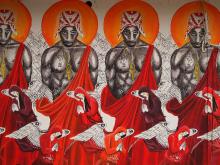Feature

When most people hear "Silicon Valley," words such as clean, pure, technologically developed, and high personal income usually come to mind.


The Haymarket Square rebellion of 1886 was a watershed moment in the history of U.S. radicalism.

Rev. Daughtry's reflections on his ministry to Tupac Shakur show us the patience and tolerance for ambiguity required in the task of ministering to those wrapped up in what some call the "thug life."

The popular rapper's life and legacy, as remembered by his pastor.

Work that is a trap, work that demeans, work that slaughters, work that destroys souls or the world—this isn't divinely ordained, nor divinely blessed.

It's 4:20 p.m. I'm standing over the Olympic soccer stadium in Sarajevo. From one goal post to the other are graves-headstones of various sizes and shapes, most unmarked.

IT WAS A WONDERFUL sunny Sunday morning in June 1996. In high spirits our group left the Franciscan monastery at Rama, in central Bosnia, to drive to the small mountain village of Podhum.

FELLOW PSYCHOLOGY STUDENTS in Nijmegen in 1957 thought initially that newly ordained Henri Nouwen wanted to cultivate important people. “We misunderstood,” recalls one. “Henri was genuinely interested in people. We didn’t notice that he was as interested in the janitor or groundskeeper as he was in the important people we were watching.”
Nearly 40 years later, this was still recognizably Henri Nouwen: eager to cultivate people of all lands, to really know them, to help them take root and grow, to nurture and nourish anyone he met.
HENRI FIRST CAME to the United States as a ship’s chaplain in his 20s, and gradually became a well-known spiritual author, teacher, and speaker. He was a hugely popular professor at Notre Dame, Yale, and Harvard, traveling widely, his influence extending to people of many faiths. He was never a cloistered academic.
Even so, it was remarkably courageous 10 years ago when Henri moved to L’Arche Daybreak in Richmond Hill, Ontario. Many members of L’Arche do not read, so Henri was choosing to live where his reputation meant nothing. His restless soul longed for a home where people would be less interested in his credentials than in who he was.
He found it: Everyone at Daybreak was interested in a 55-year-old priest of such brilliance who seemed unable to make a sandwich; who totaled a new car driving it away from the dealership; who spoke with his giant hands flailing and his whole gangly body quivering with his desire to communicate; whose Dutch accent could offer a whole meditation on “face” and only halfway in would we catch on that he was speaking of faith ; who might in a single week be giving talks on three continents; whose friends came hitch-hiking and in private planes; who loved to dance with the community’s children at liturgies; who willingly shared in his 30-some books details of his inner life that most of us would cringe to admit, much less publish! Daybreak met a deep need in the heart of someone very gifted and very broken, wonderful in his capacity for friendship and insatiable in his need for friendship.
Just as Daybreak loved Henri, he grew to love Daybreak. He developed a deep friendship with Adam Arnett (1961-1996), a man who never spoke a word. Henri describes that relationship in his forthcoming book, Adam (Orbis Books). Henri continued to accept speaking engagements, but rarely traveled without members of the community to speak with him. “People won’t remember a word I said,” he reflected, “but they’ll remember that Bill Van Buren and I stood here as friends and equals and spoke together.”
Once an audience of several thousand people was hanging silently on to his every word. As he reached the climax of his insights, Bill leaned over and spoke into the microphone: “I’ve heard that before.” It totally exploded the suspense. Henri loved to tell that story.
A century and a half ago, a young congressman from Illinois became unpopular with his home constituency and was forced to leave office. It had been rumored that he had little respect for the church or religion; furthermore, he was obviously unpatriotic for opposing the U.S. war with Mexico.
A decade later the same man returned to political life, became a vociferous critic of slavery, and was eventually elected president of the nation. This is the man who in his second inaugural address made one of the most explicitly biblical statements in the annals of the American presidency:
Fondly do we hope—fervently do we pray—that this mighty scourge of war might speedily pass away. Yet, if God will that it continue, until all the wealth piled by the bond-man's two hundred and fifty years of unrequited toil shall be sunk, and every drop of blood drawn with the lash shall be paid by another drawn by the sword, as was said three thousand years ago, so still it must be said, "the judgments of the Lord are true and righteous altogether" (Psalm 19:9).
The life of Abraham Lincoln reminds us of two things about religion and American political life. First, they have always been mixed together. Second, church people do not have infallible political judgment.
As citizens of what the historian Sidney Mead called "the nation with the soul of a church," most Americans have thought from the colonial period on that their religious convictions had something very important to do with their political choices. The present highly visible involvement of Christian and other religious groups in political life, including presidential campaigns, is hardly novel.
After reading the first issue of Sojourners' precursor The Post-American in 1971, Sen. Mark O. Hatfield wrote to the editors, "I believe you may be helping to ignite a new movement of the Spirit in our land." Hatfield, an evangelical Christian and a Republican from Oregon, has remained a friend (and served as contributing editor) of Sojourners since that introduction. He announced earlier this year that this term in the Senate, his fifth, will be his last. Sojourners editor Jim Wallis interviewed Hatfield in July at his Senate office in Washington, D.C.
—The Editors
Jim Wallis: It's hard to believe, in some ways, that you're leaving the Senate. Ever since I've been politically conscious, you have been, in my view, the political conscience of this body. You have raised moral questions that no one else was raising.
I remember years ago you gave a wonderful Prayer Breakfast speech about Vietnam, and President Nixon and Henry Kissinger were there, and you talked about the war as a sin. You have always been one to raise what you felt to be the moral question, which derived for you from your Christian faith. Is it possible to link faith and politics in a place like this?
Sen. Mark Hatfield: I'm not one of those who believes you can compartmentalize between your public and private life, between your spiritual and secular life. As I understood my commitment to Christ, it was an integrated commitment in all aspects of my life. I often say that my first commitment is to the Lord, my second is to my family, and my third is to my constituents. Keeping them in that order, I feel, puts me in the best position to serve my constituents.
I'm not suggesting my voting record should be blamed on the Lord. It's from my experiences, mixed with study, analysis, and intellect, that I take this position or have that viewpoint.
In American political life, there is an issue about which we hear endless talk dealing with surfaces, and very little movement deep down in the body politic. Unless faced, it will prevent us from realizing our potential as a pluralistic democracy with a growing economy, and, instead, it will foster a poisonous resentment, even a hatred, that kills much of life's joy. The subject is race. Frequently, Americans have been unable to see deeper than skin color or eye shape to the heart and individuality of all our citizens. There were times when we allowed destructive impulses to triumph over our deeper awareness that we are all God's children. Occasionally, the violence of the few elicited the fears and seething anger of the many and prevented the possibility of racial harmony. It's an old story, and a sad one, too.
In 1963, four African-American girls in white dresses were talking prior to Sunday services in the ladies lounge of the 16th Street Baptist Church in Birmingham, Alabama. Suddenly, the church was ripped apart by a bomb that killed the young girls instantly. There had been other bombings in Birmingham aimed at halting blacks' progress toward racial equality but they had not penetrated the national consciousness. After that Sunday's explosion, people of all races and all political persuasions throughout the country were sickened in spirit.
Coming 18 days after Martin Luther King Jr. had shared his dream for America from the steps of the Lincoln Memorial, the bombing was a stark reminder of how violently some Americans resisted racial healing. Yet the sense of multiracial outrage and solidarity that came out of this tragedy--combined with the seminal leadership of President Lyndon Johnson--led to the Civil Rights Act of 1964, and to the hope that the search for racial equality could lead to the emergence of a spiritually transformed America.